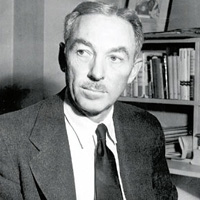Spring (April 1941) by E. B. White: Summary
In this essay White is making notes on springtime and intoxication. The essay moves from one item to the next from the condition of a log to a letter about superman, from Little Women to lambs, from snakes to starlings, from chicks to the war. The writer is not sure whether his hog has been mated and will produce young. He and pigmen are curiously waiting for the result. Last year the hog had seven, which were very good.

Elwyn Brooks White (1899-1985)
In her letter to White, Miss Moore mentions that children read those books which are approved by the Superman and that even the teachers make their pupils obedient by taking the name of Superman. Instead of reading Little Women, persons today are interested in comics.
A lamb is affected by spring. The suckling lamb is strong enough, but the older ones when they come back from the pasture fall down. They create foam at the mouth and grind their teeth. The writer has not seen a snake but he has seen starlings making their nests hurriedly for reproduction.
In a poem Robert Frost describes the happy warm moment of spring disturbed by a cloud and the cold wind. But one can enjoy even such a day in spring when there is not wind in the hills and in the mind. Such a warm day is really memorable. The ewe suckles her lambs and lie quietly. Man and animals want to sit down in the sun lazily and with great satisfaction. The muddy road seems completely dried up. Outside the living-room window one can see the yellow flowers blooming. The goose settles down on her eleven eggs in order to hatch them. The air looks not like an invader but like a friend. Young boys are involved in making sugar. The writer had homemade syrup on pancakes. It had a strange wooden taste because it was made from maple trees. According to his friend the writer was sharing his experiences happily with his readers.
Tending a brooder stove is really problematic and confining. All brooder stoves are unpredictable. But the writer's one has a fair record. But his stove occupies his dreams. He goes to the barn house to check if it is all right. If he is lucky the temperature will be 88° and the chick will be eating happily. But if the wind has caused all the coal burn up, the temperature will be 68°. The chicks will be shivering with cold. A stove may have a fixed position, but a hen can control the temperature perfectly and her warmth keeps the chicks in a better condition. A hen can communicate better than a stove. The service of the hen is more reliable than that of the stove.
A fire maker is supposed to be very happy. But the operator of the brooder stove is in a pitiable condition. On his fire, the safety of the chicks and the tenants depends. If the temperature there decreases even fifteen degrees, the chicks will crowded in the corner and die from suffocation.
In the spring of 1941, the writer found himself crazy because the whole world was involved with war activities but he was looking after, some chickens. He found farming good and books about country life worth reading. On the sixth of April, the German had attacked on the Balkans. But the writer was trying to finish his incomplete writing. He was working hard. At the same time he had to be sure whether the stove was burning properly. When he went into the barn house, he found that the chicks had gathered in a big black mass against one wall because of coId.
The writer felt that people might call him a fool. Just then somebody knocked on the door. It was his boy who said that the supper was ready and that the war news was very bad. For a second he felt that he had been defeated, and confused and afraid. But soon he knew that the remaining warmth in his stove had to be increased to oppose the Nazi idea of spring. He increased the fire a little and placed the chicks safely in a bucket. After supper he went there again. He found a bucketful of dead ashes. Then he placed another batch of chicks into the bucket. Luckily, there was a healthy fire out of the dead ashes.
Countries were destroyed and people were killed. But the writer considered the food and warm fire more valuable.
More about Spring (April 1941)
Critical Commentary of Spring (April 1941)
Biography of Elwyn Brooks White
 |
bachelorandmaster.com |